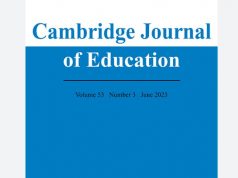One key ‘essential’ use of technology in education over the next few decades might well be for crisis situations. This was certainly brought to the world’s attention by the rapid shutdown of global schooling in light of the COVID pandemic – reckoned to have forced around 94% of the world’s student population into emergency forms of remote schooling and distance learning at various points during the first nine months of the pandemic (UNESCO 2020).
While these interruptions might have seemed unprecedented to some onlookers in high-income nations, the COVID school shutdowns were by no means the first (or last) time that schooling for large numbers of students is abruptly curtailed due to some sort of emergency. As the past few years have shown, forced school closures and unplanned interruptions to schooling are caused by all manner of crises and emergency – from public health crises such as pandemics, disease and famine, through to environmental disasters such as flooding, cyclones or wildfires, as well as war and political unrest.
There is little reason to presume that such conditions will not escalate across the 2020s, 2030s and beyond. Indeed, in an era of increased geo-political instability and forced climate migration, we will certainly need to pay more attention to the emergency education of displaced populations – already evident in the deployment of technology-based education within refugee camps and other displaced migrant groups.
With all of these scenarios looking to increase in frequency and intensity over the next few decades, it seems sensible for ed-tech communities to focus much more on how technology can be used as part of countries’ crisis response, and efforts to provide some form of ‘emergency remote education’.
Helen Compton and colleagues (2021) provide a useful overview of the forms that this ‘emergency’ ed-tech needs to take – pointing out that the most essential technology uses under such circumstances often boil down to sustaining some form of communication between teachers and students, ensuring the basic delivery of instructional content, and substituting for the familiar physical resources used in schools.
Of course, as was the case with the COVID pandemic in high-income countries, these forms of ed-tech might involve the continued use of relatively sophisticated online platforms and digital devices. However, localised emergency circumstances (such as natural disasters) will often require more low-tech and off-grid options. For example, in many contexts where reliable infrastructure and connectivity is no longer available (if it ever was), then use of mobile phones can be invaluable, as well as offline technologies such as pre-loaded USB sticks, alongside analogue options such as radio and television.
So, the ed-tech community needs to take seriously the prospect of a future where one of the big educational challenges in North America, Europe and other high-income regions is the capacity to ensure continuity of basic educational provision. This suggests the need for a radical shift in mindset and culture. Perhaps we need to spend less time, effort and money on developing speculative high-tech applications that are likely only to be of marginal use to the most privileged education consumers? Perhaps we need to spend more time learning from technology development efforts in regions that have long been facing up to these ‘emergency’ challenges? Perhaps we need to flip the essentially optimistic, solutionist and ‘best-case’ mindsets that pervade ed-tech to one of coping with worse-case-scenarios? In the next few decades, the most pressing (and certainly most useful) question to be asking might well be: What is the worst that might happen, and how can educational technology be part of our efforts to survive?
**
REFERENCES
Crompton, H., Burke, D., Jordan, K., & Wilson, S. (2021). Learning with technology during emergencies: a systematic review of K‐12 education. British Journal of Educational Technology [forthcoming]
UNESCO. (2020). School closures caused by Coronavirus (Covid-19). https://en.unesco.org/covid19/educationresponse







